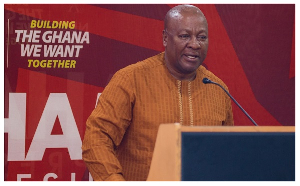 Former president, John Dramani Mahama
Former president, John Dramani Mahama
Dr. Jamal Mohammed, a Senior Lecturer in Economics at Koforidua Technical University and Executive Director of the African Development Resources Research Institute (ADRRI), has suggested that the proposed 24-hour economy policy by the National Democratic Congress (NDC) flagbearer should incorporate an hourly-wage structure that will motivate the youth to work at night.
Dr. Mohammed argues that such a wage structure would not only enhance productivity but also create opportunities for part-time employment.
He describes the 24-hour economy as a timely economic intervention, considering the current economic situation in Ghana.
He believes this policy will boost production, increase productivity, and create jobs, thereby positively impacting the country’s economic growth.
However, Dr. Mohammed cautions that the policy must be carefully planned to spur industrialization, meet local demand, and increase exports to reduce pressure on the local currency by decreasing imports.
John Dramani Mahama, the NDC flagbearer, outlined that the objective behind the 24-hour economy initiative is to enable businesses to operate three shifts per day. He emphasizes that the government and private sector will collaborate to achieve this goal.
“The 24-hour economy is designed to create new employment opportunities, particularly for young people, address unemployment, and enhance living standards in Ghana,” Mahama stated.
In a social media post, Mahama mentioned that his government would enact new laws to support businesses operating around the clock, including labour laws and tax incentives.
He also promised favourable tax policies, stimulus packages, and financial assistance for specific industries, including agro-processing and manufacturing.
“Buying local products and services will be the government’s top priority, and measures will be implemented to ensure the smooth operation of the 24-hour economy,” Mahama added.
He highlights that security, sanitation, cleaning, and environmental protection will be critical components of this initiative. Additionally, financial services at the ports will operate 24/7 to reduce delays and congestion.
The 24-hour economy initiative aims to benefit various sectors, create jobs, improve living standards, increase productivity, and provide convenience for citizens.